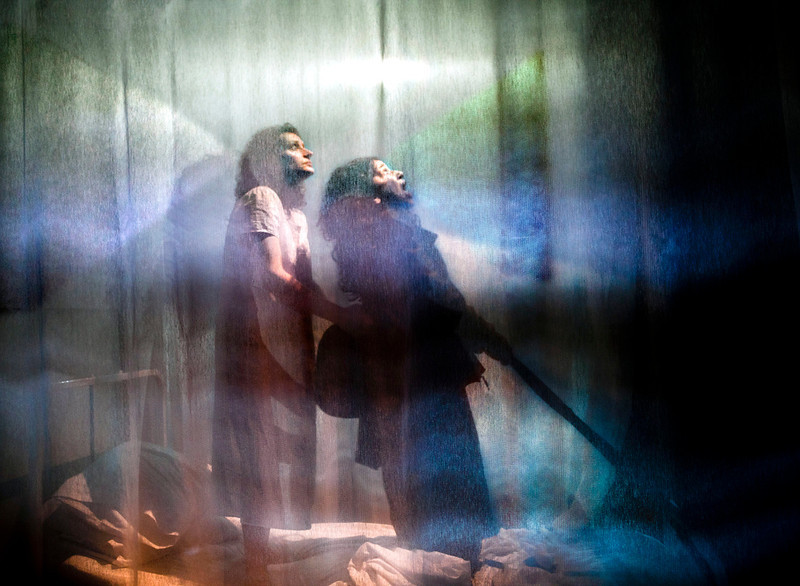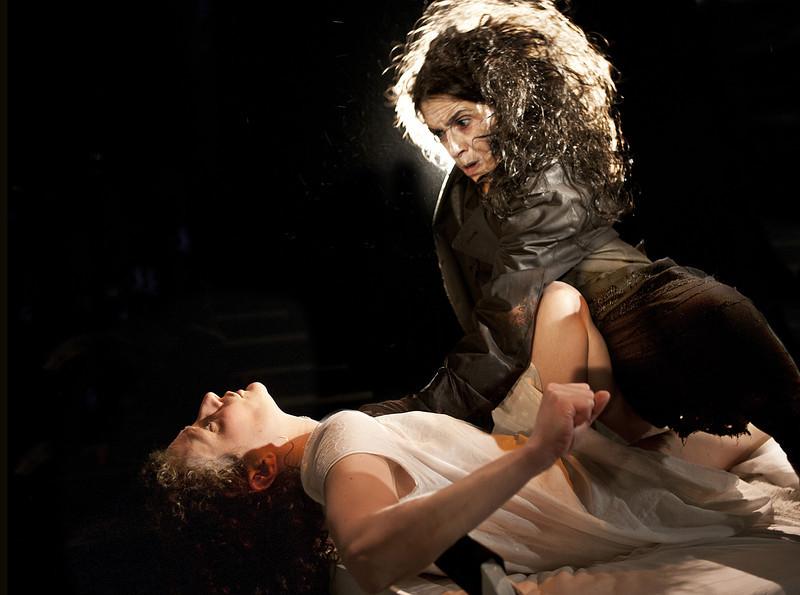It’s like waiting for a number 19 bus. You hang around for half an hour then two come along at once. So it is just now with plays either written by women or featuring women’s lives. While Amelia Bullimore’s sparky three-hander Di and Viv and Rose is storming audiences in Hampstead, Mehmet Ergen, the dynamic Turkish-born founder of both Southwark Playhouse and the Arcola, is continuing to make waves in unfashionable Hackney and Dalston.
Directed by Ergen and written by Leyla Nazli, Mare Rider offers up a hallucinatory and disturbingly revisionist feminist fable for our time. The title character is a child-stealing figure from Turkish mythology through whom Nazil deftly weaves a parallel reflection of modern woman’s dilemmas, at the same time reminding us that much of the female enslavement spoken of here in the past remains present in other parts of the world today.
It provides some uncomfortable - though not too astringent - critiques of contemporary 'have-it-all' womanhood
Female figures from mythology carry a potent strength in the collective unconscious. In her programme notes, Nazli refers to the Irish banshee, the Amazon, Lilith and Lady Godiva, to name but a few. Mixing myth with the present can be a dangerously unstable brew, producing either fireworks or an artistic stillborn. That Mare Rider does indeed take flight is due in no small measure to the presence of Kathryn Hunter, who invests Nazli’s wine-drinking, pipe-smoking, bareback-riding Anatolian Elka with mischievous, earthy, three-dimensional reality.
It’s also partly due to the theatre’s ambience and renovated setting. When the Arcola moved into their present surroundings, an old paint factory off Hackney’s Kingsland High Street, they inherited a cold, damp edifice out of which they carved a tiny, fairly inhospitable foyer, a small studio and a vauntingly high main auditorium. Acoustics were difficult and it was a challenge even to negotiate the stairs down to the subterranean loos. Now the entrance leads into a wide, welcoming foyer, a comfortable bar and café, and a main theatre sheared in two by black lacquered panels hiding offstage mechanics. It looks amazing and acoustically is much improved; with Mare Rider Ergen staging the production in traverse, concentrating sight and sound in one central space.
As we enter Anna Francolini’s Selma lies barely breathing in a hospital bed. There are the sounds of a horse and a shadowy figure emerges, wreathed in a mob of undulating dark hair and black cloak. Elka has come to haunt Selma, a woman who has just given birth in, of all unromantic places, Hackney’s Homerton Hospital. With past and present, myth and contemporary consciousness colliding, what ensues is an almighty tussle in which we are asked to believe that Selma’s sanity, not to say the fate of her son, hangs in the balance.
 Nazli gives Elka a rich, shocking past, invoked through a mixture of devices ranging from high flown rhetoric to caustic, aggressive irony and some stylish visual projections. Rebelling from the role of dutiful home-maker, in the process she has become an ogre to her own kind, striking fear into other women in childbirth and acquiring a hideous reputation from the very freedoms so hard won.
Nazli gives Elka a rich, shocking past, invoked through a mixture of devices ranging from high flown rhetoric to caustic, aggressive irony and some stylish visual projections. Rebelling from the role of dutiful home-maker, in the process she has become an ogre to her own kind, striking fear into other women in childbirth and acquiring a hideous reputation from the very freedoms so hard won.
Elka’s flights of romantic adventuring – the midnight rides, the deep forests, the stars – are, typically, given a wonderfully strange aura of physical otherness by Hunter in the manner that is so inimical to her. Beside her, Francolini conveys the very essence of modern woman with her justifications of career and late pregnancy, but one who, Elka points out, may not be as free as she thinks.
This is the real strength of Nazli’s 65-minute invention. As Elka and Selma overhear Selma’s husband Mark (Matthew Flynn) talking to the ward nurse, contemporary life as seen through a fresh, foreign prism comes into sharper focus, providing some uncomfortable - though not too astringent - critiques of modern, “have-it-all” womanhood. Through beautifully nuanced writing, Matthew Flynn makes Mark unbearably moving as a man who loves but barely comprehends what may be going on inside the mind of his traumatised wife. A salutary, enigmatic but ultimately beguiling tale.















Add comment